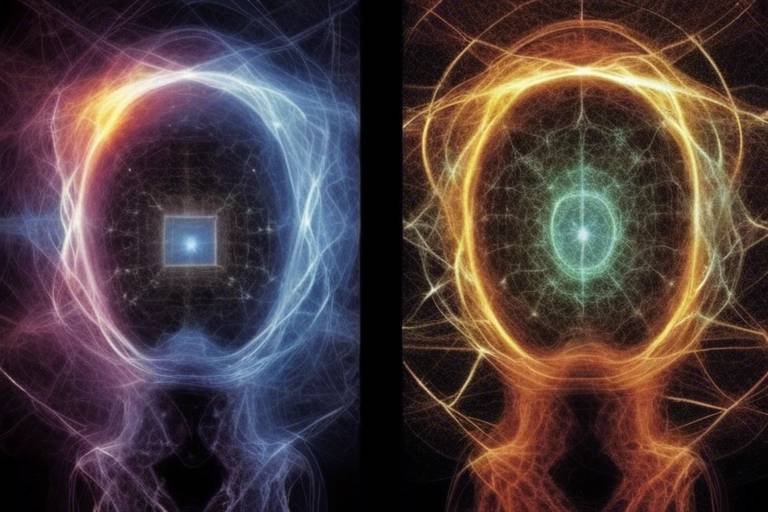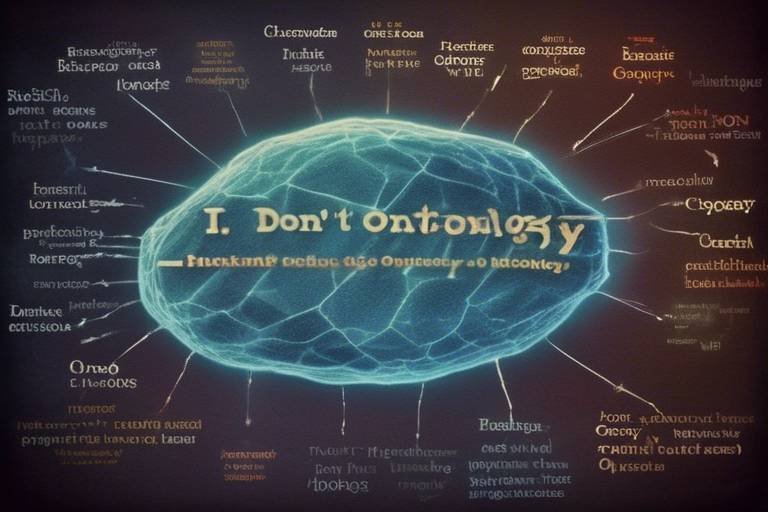The Impact of Metaphysics on Theological Beliefs
In the vast landscape of human thought, metaphysics serves as a bridge between the abstract and the tangible, weaving intricate connections between our understanding of existence and the divine. When we delve into the realm of theology, we find that metaphysical concepts do not merely exist in a vacuum; rather, they profoundly shape and influence our theological beliefs. This interplay between metaphysics and theology is akin to a dance, where each step taken in one discipline resonates in the other, creating a rich tapestry of belief systems that span across cultures and epochs.
Metaphysics, with its focus on the fundamental nature of reality, existence, and the universe, provides a framework within which theological ideas can flourish. For instance, when we ponder the question of God's existence, we are not just engaging in a theological debate; we are also grappling with metaphysical inquiries about what it means to 'exist' in the first place. This exploration leads us to consider how different religious traditions articulate their understanding of the divine, often reflecting the metaphysical assumptions that underpin their doctrines.
Moreover, the significance of metaphysics in shaping theological beliefs can be seen in how various religions interpret key concepts such as creation, morality, and the afterlife. These interpretations often hinge on metaphysical ideas about causality and essence. For example, the concept of causality raises profound questions about how God interacts with the world. Does God intervene directly in human affairs, or is the universe governed by a set of natural laws that operate independently of divine influence? Such inquiries illuminate not only the nature of divine action but also the implications for human free will and moral responsibility.
As we navigate through these complex waters, it becomes clear that metaphysical beliefs are not static; they evolve and adapt, influencing religious practices and community structures. This dynamic nature of metaphysics invites us to explore how different traditions approach the divine and the nature of reality. In doing so, we may uncover both commonalities and divergences that enrich our understanding of faith.
In essence, the impact of metaphysics on theological beliefs is profound and multifaceted. It invites us to question, reflect, and engage with the deeper meanings of our existence and the divine. As we continue to explore this intricate relationship, we must remain open to the myriad ways in which metaphysical thought can illuminate our spiritual journeys.
- What is metaphysics? Metaphysics is a branch of philosophy that explores the fundamental nature of reality, existence, and the relationship between mind and matter.
- How does metaphysics influence theology? Metaphysics shapes theological beliefs by providing a framework for understanding concepts such as existence, causality, and the nature of the divine.
- Are metaphysical beliefs the same across all religions? No, metaphysical beliefs can vary significantly across different religious traditions, leading to unique interpretations of the divine and existence.
- Can metaphysical ideas change over time? Yes, metaphysical ideas are dynamic and can evolve in response to new philosophical debates and cultural shifts.

The Relationship Between Metaphysics and Theology
Understanding how metaphysics informs theological frameworks is essential for grasping the depth of religious beliefs and practices. Imagine metaphysics as the underlying architecture of a grand cathedral; it provides the foundational principles that guide spiritual understanding, shaping the way we perceive the divine and our place in the universe. The interplay between these two fields is akin to a dance, where each step influences the other, creating a harmonious relationship that enriches the human experience of faith.
At its core, metaphysics delves into questions about existence, reality, and the nature of being. These inquiries naturally lead to theological considerations, as they probe into the very essence of what it means to believe in a higher power. For instance, when we ponder the nature of existence, we are not merely contemplating the physical world around us; we are also exploring the implications of a creator, the concept of the soul, and the possibility of life beyond death. This exploration often reveals a tapestry woven with various threads from different religious traditions, each contributing its unique perspective.
Moreover, metaphysics challenges us to think critically about the principles that underlie our beliefs. It encourages us to ask profound questions such as: What is the nature of God?, How does divine action manifest in the world?, and What is the relationship between free will and predestination? These questions not only enrich our understanding of theology but also invite us to engage in a deeper dialogue with our faith. The answers we find can either solidify our beliefs or lead us to question aspects of our doctrines, fostering a dynamic and evolving understanding of spirituality.
In essence, the relationship between metaphysics and theology is not a mere academic exercise; it is a vital conversation that has been ongoing for centuries. The insights gained from metaphysical inquiry can illuminate theological doctrines, revealing their strengths and weaknesses. This interaction is particularly evident in the way different religious traditions interpret divine attributes, causality, and the afterlife. As we navigate this complex landscape, we find that both fields are enriched by their mutual engagement, leading to a more profound appreciation of the mysteries of existence.
As we explore this relationship further, we will see how key metaphysical concepts such as existence, causality, and essence play a crucial role in shaping theological perspectives across various religions. By examining these intersections, we not only deepen our understanding of specific faith traditions but also uncover the universal questions that unite humanity in its quest for meaning and connection with the divine.
- What is metaphysics? Metaphysics is a branch of philosophy that explores the fundamental nature of reality, including concepts such as existence, objects, and their properties.
- How does metaphysics influence theology? Metaphysics provides the foundational principles that guide theological beliefs, shaping our understanding of the divine and the nature of existence.
- Can theology exist without metaphysics? While theology can exist independently, metaphysics enriches and deepens theological inquiry by addressing profound questions about reality and existence.

When we dive into the world of theology, we quickly discover that it is interwoven with metaphysical concepts that shape our understanding of the divine and existence itself. These concepts are not mere abstract ideas; they form the backbone of many religious doctrines and beliefs. Think of metaphysics as the foundation of a house, where theology is the structure built upon it. Without a solid foundation, the house risks crumbling. In this section, we will explore three pivotal metaphysical concepts: existence, causality, and essence, and how they influence theological perspectives across various faith traditions.
The metaphysical question of existence is perhaps one of the most profound inquiries in both philosophy and theology. Different religious traditions interpret the nature of being in unique ways that directly impact their understanding of God and creation. For instance, in monotheistic religions like Christianity, Judaism, and Islam, God is often viewed as the ultimate being whose existence is necessary and self-sustaining. This contrasts sharply with polytheistic traditions, where gods may embody specific aspects of existence or natural phenomena. The question "What does it mean to exist?" leads us to ponder not only the nature of the divine but also our own existence as human beings. Are we merely products of chance, or is there a greater purpose behind our being?
Another essential metaphysical concept is causality, which plays a critical role in understanding how God interacts with the world. The relationship between cause and effect raises intriguing questions about divine action. For example, if God is the first cause of everything, how does this influence our understanding of free will? Do we act independently, or are our actions predetermined by divine will? This concept is pivotal in theological discussions about miracles, providence, and the nature of human agency. The interplay between divine causation and human action creates a dynamic tension that theologians have grappled with for centuries, leading to various interpretations and doctrines regarding free will and divine sovereignty.
Metaphysical discussions about the essence and attributes of God provide profound insights into theological interpretations. When we talk about God's essence, we are referring to what it means for God to be God. Different religious traditions attribute various qualities to the divine, such as omnipotence, omniscience, and omnipresence. These attributes shape believers' understanding of God's nature and how they relate to the divine. For instance, if God is all-powerful, what does that imply about human suffering? Does it challenge our understanding of God's goodness? The nuances of these discussions are vital for grasping the diverse theological landscapes across different faiths.
Metaphysical views on the afterlife also play a significant role in shaping theological beliefs about human existence and morality. Different religions offer varying interpretations of what happens after death, which in turn affects how adherents approach life and ethical living. For example, in many Eastern religions, the concept of reincarnation emphasizes the cyclical nature of existence and moral responsibility. In contrast, Abrahamic faiths often focus on a final judgment and eternal destinations like heaven or hell. These metaphysical perspectives not only influence individual beliefs but also shape communal practices and rituals surrounding death and the afterlife.
| Metaphysical Concept | Theological Implications |
|---|---|
| Existence | Understanding the nature of being influences views on creation and God’s role. |
| Causality | Explores the relationship between divine action and human free will. |
| Essence | Defines God’s nature and attributes, affecting theological interpretations. |
In conclusion, the interplay of these metaphysical concepts serves as a lens through which we can better understand the complexities of theological beliefs. By examining existence, causality, and essence, we not only enhance our understanding of various religious doctrines but also invite deeper reflections on our own beliefs and the nature of the divine.
- What is metaphysics? Metaphysics is a branch of philosophy that explores the fundamental nature of reality, including concepts like existence, being, and the universe.
- How does metaphysics relate to theology? Metaphysics provides the foundational principles that inform theological beliefs, influencing how different religions understand the divine and existence.
- Why are metaphysical concepts important in religion? These concepts shape the doctrines and practices of various faiths, helping adherents make sense of their beliefs and the world around them.

When we dive into the metaphysical question of existence, we find ourselves navigating a complex landscape of beliefs that vary widely across different theological traditions. At its core, the inquiry into existence is not just about asking, "What is there?" but rather, "Why is there something instead of nothing?" This profound question has sparked debates among philosophers, theologians, and everyday seekers of truth for centuries. Each tradition offers its own interpretation, painting a rich tapestry of understanding that influences how adherents perceive the divine and the universe.
For instance, in Christian theology, existence is often tied to the notion of a creator God who brings everything into being. This perspective suggests that all of creation stems from God's will, emphasizing a relationship where existence is a gift. Conversely, in Buddhism, the focus shifts to the concept of emptiness (śūnyatā), where existence is seen as transient and interconnected, challenging the notion of a permanent self or creator. This stark contrast raises fascinating questions about the nature of reality and our place within it.
Furthermore, the exploration of existence leads us to consider the implications of being and non-being. Different philosophical schools provide various lenses through which to view these concepts. For example, existentialist thinkers like Jean-Paul Sartre argue that existence precedes essence, meaning that individuals create their own meaning and identity through their choices. This idea resonates with many who seek autonomy in their spiritual journeys, suggesting that existence is not merely a state of being but an active process of becoming.
In examining these diverse perspectives, we can identify some key questions that emerge:
- What does it mean to exist?
- Is existence inherently meaningful, or do we assign meaning to it?
- How do different cultures and religions shape our understanding of existence?
This exploration of existence is not just an academic exercise; it has real-world implications for how individuals and communities understand their lives and their faith. It influences everything from ethical decisions to the way people engage in rituals. For example, if one believes in a personal God who actively participates in the world, this may lead to a more communal and ritualistic approach to worship. In contrast, a belief in a more abstract notion of existence might encourage a focus on meditation and personal enlightenment.
Ultimately, grappling with the nature of existence is a deeply personal journey. It invites us to reflect on our beliefs and consider how they shape our understanding of the world around us. Whether through the lens of a particular faith or a more philosophical approach, the quest for understanding existence is a fundamental aspect of the human experience.
- What is the significance of existence in theology?
Existence serves as a foundational concept in theology, influencing how we understand the divine, creation, and our purpose in life.
- How do different religions view existence?
Different religions offer varied interpretations of existence, from the Christian view of a creator God to the Buddhist concept of emptiness.
- Can our understanding of existence change over time?
Yes, as individuals grow and experience life, their understanding of existence may evolve, influenced by personal experiences and philosophical inquiries.

The concept of causality is a cornerstone in the dialogue between metaphysics and theology. It raises profound questions about how the divine interacts with the world. At its core, the notion of causality examines the relationship between causes and effects, providing a framework for understanding how events unfold in the universe. When we consider divine action, we must grapple with the implications of causality: If God is the ultimate cause of all that exists, how does divine action manifest in our lives? This inquiry leads us to explore various theological interpretations of God's involvement in the world.
In many religious traditions, God is seen as not just a distant creator but an active participant in the unfolding of history and the lives of individuals. This belief prompts a closer look at how divine action is perceived. For instance, in Christianity, the idea of God intervening in human affairs is often illustrated through miracles, providence, and the incarnation of Christ. Similarly, in Islam, God's will is viewed as directly influencing the course of events, where divine decree shapes the destiny of all beings. These perspectives highlight a dynamic relationship between the divine and the temporal world, where causality is not merely a linear sequence but a complex interplay of divine intention and human response.
However, the question of free will complicates this relationship. If God is the primary cause, what does that mean for human agency? Are we merely puppets in a grand design, or do we possess the autonomy to make choices? This tension between divine sovereignty and human freedom has led to various theological positions. Some argue for a compatibilist view, where divine action and human free will coexist harmoniously, while others adopt a more deterministic stance, suggesting that divine causality ultimately governs all actions.
To illustrate these concepts further, consider the following table that summarizes different theological perspectives on causality and divine action:
| Theological Perspective | View on Causality | Implications for Free Will |
|---|---|---|
| Classical Theism | God as the first cause of everything | Free will exists but is influenced by divine will |
| Open Theism | God knows all possibilities but allows genuine free choice | Human choices significantly shape outcomes |
| Determinism | All events are preordained by God | Free will is an illusion; all actions are predetermined |
Ultimately, the exploration of causality and divine action invites believers to reflect on their understanding of God’s nature and their place within the divine narrative. It challenges us to consider how our actions resonate within the grand tapestry of existence, woven by both human choices and divine intentions. As we navigate these complex waters, we find that the interplay between causality and divine action not only enriches our theological beliefs but also deepens our relationship with the divine.
- What is causality in the context of theology? Causality refers to the relationship between cause and effect, particularly how divine action influences the world and human lives.
- How do different religions view divine action? Different religions interpret divine action in various ways, often reflecting their understanding of God's nature and involvement in the world.
- Can free will coexist with divine causality? This is a debated topic, with some theological perspectives suggesting that free will and divine causality can harmoniously coexist, while others argue for a deterministic view.

The essence and attributes of God are central themes in theological discourse, serving as the bedrock upon which various religious beliefs are constructed. When we talk about the essence of God, we are diving deep into the philosophical waters that ask, "What is God?" This question isn't merely academic; it's profoundly personal and existential. Different traditions provide varying answers, shaping how adherents perceive the divine and their relationship with it. For instance, in monotheistic religions like Christianity, Judaism, and Islam, God is often described as a singular, all-powerful being, possessing attributes such as omnipotence, omniscience, and omnipresence. This concept can be likened to a vast ocean—limitless and unfathomable—where each wave represents a different attribute, yet all are part of the same body of water.
In contrast, polytheistic traditions, such as Hinduism, offer a more nuanced view of divinity, presenting multiple gods, each with distinct essences and attributes. Here, the divine can be seen as a vibrant tapestry, where each thread represents a different aspect of the divine experience. This rich variety allows adherents to connect with the divine in ways that resonate deeply with their personal experiences and cultural backgrounds.
One of the most compelling discussions around God's attributes is the debate over whether these attributes are essential to God's nature or merely descriptive. For instance, is God's omnipotence a fundamental aspect of who God is, or is it merely a way for humans to understand God's actions in the world? This question opens the door to a plethora of philosophical inquiries and theological interpretations, leading to a deeper understanding of the divine.
Moreover, the attributes of God often reflect the values and ethics of the cultures in which these beliefs are rooted. For example, the concept of God's mercy is particularly emphasized in Christianity, providing a comforting assurance of forgiveness and grace. In contrast, the emphasis on justice in Islam highlights the moral accountability of individuals, showcasing a different facet of the divine character. These varying attributes create a rich dialogue between believers and their understanding of morality, purpose, and existence.
To provide a clearer picture, let’s summarize some key attributes of God as understood across different theological perspectives in the table below:
| Theological Tradition | Key Attributes of God |
|---|---|
| Christianity | Omnipotent, Omniscient, Omnibenevolent, Personal |
| Islam | Omnipotent, Merciful, Just, Transcendent |
| Hinduism | Immanent, Transcendent, Diverse, Multifaceted |
In conclusion, the essence and attributes of God are not just abstract ideas; they are the lenses through which believers interpret their world, their morality, and their purpose. Understanding these attributes allows for a richer engagement with theology and spirituality, prompting individuals to reflect on their beliefs and the divine's role in their lives. As we navigate through these complex waters, we must remain open to the myriad ways in which people experience and understand the divine, fostering a sense of empathy and respect across different faith traditions.
- What is the essence of God? The essence of God refers to the fundamental nature or being of God, often described in terms of attributes such as omnipotence, omniscience, and omnipresence.
- How do different religions view God's attributes? Different religions emphasize various attributes of God, reflecting their unique beliefs and cultural contexts. For example, mercy is highlighted in Christianity, while justice is emphasized in Islam.
- Can God's attributes change? Most theological perspectives assert that God's attributes are unchanging and eternal, though interpretations of these attributes may evolve over time.

The concept of the afterlife is one of the most profound and intriguing topics in both metaphysics and theology. It addresses the fundamental questions of what happens after death, the nature of existence beyond the physical realm, and the implications for human morality and purpose. Different metaphysical perspectives shape our understanding of the afterlife, often reflecting the cultural, spiritual, and philosophical contexts from which they arise. For instance, in many religious traditions, the afterlife is seen as a continuation of the soul's journey, where the essence of a person transcends the physical body. This notion leads to various interpretations of what this existence entails, ranging from eternal bliss to cycles of rebirth.
One significant metaphysical perspective on the afterlife is the idea of dualism, which posits that the mind or soul is distinct from the body. This view can be traced back to ancient philosophers like Plato, who believed in an eternal realm of forms, where the soul returns after death. Many religious doctrines, including Christianity and Islam, echo this sentiment by suggesting that the soul is judged and sent to an eternal state of either reward or punishment. In contrast, other traditions, such as Buddhism, offer a more cyclical view of existence, where the afterlife is not a final destination but rather a part of an ongoing cycle of birth, death, and rebirth, influenced by one's karma.
Furthermore, metaphysical discussions about the afterlife often raise questions about morality and ethical living. If one believes in an afterlife where actions have consequences, it can lead to a more conscientious approach to life. This belief system can be seen in various religions that emphasize moral behavior as a means to achieve a favorable afterlife. For example, many religions advocate for compassion, altruism, and justice, connecting these virtues directly to the fate of the soul after death.
To illustrate the diversity of metaphysical perspectives on the afterlife, consider the following table that summarizes key beliefs across different traditions:
| Religious Tradition | Metaphysical Perspective on Afterlife |
|---|---|
| Christianity | Belief in heaven and hell; eternal judgment based on faith and actions. |
| Islam | Paradise and Hell; life is a test, and actions determine one's eternal fate. |
| Buddhism | Cyclic existence (samsara); enlightenment leads to liberation from the cycle. |
| Hinduism | Reincarnation; karma influences the soul's next life and ultimate liberation (moksha). |
| Secular Humanism | No belief in an afterlife; emphasis on living a meaningful life in the present. |
Ultimately, the metaphysical perspectives on the afterlife serve as a mirror reflecting our deepest fears, hopes, and aspirations regarding existence itself. They challenge us to ponder significant questions: What does it mean to live a good life? How do our actions resonate beyond our physical existence? As we explore these profound ideas, we engage with the very essence of our humanity, seeking to understand not just the afterlife but the life we lead now.
- What is the afterlife? The afterlife refers to the existence or state of being that follows physical death, often interpreted differently across various religious and philosophical traditions.
- Do all religions believe in an afterlife? While many religions have concepts of an afterlife, beliefs can vary significantly, with some traditions emphasizing reincarnation, while others focus on eternal reward or punishment.
- How do metaphysical beliefs influence views on morality? Many metaphysical perspectives connect moral behavior with afterlife consequences, encouraging individuals to act ethically in life.
- What role does dualism play in beliefs about the afterlife? Dualism posits a separation between body and soul, influencing many religious beliefs that suggest the soul continues to exist after physical death.

When we dive into the fascinating world of comparative theology, we uncover how various religious traditions interpret metaphysical concepts. This exploration is not merely academic; it’s like peeling back layers of an onion, revealing the core beliefs that shape different faiths. Each religious tradition, whether it be Christianity, Islam, Hinduism, or Buddhism, offers a unique perspective on metaphysical questions, leading to a rich tapestry of beliefs about the divine and the nature of reality. But what does this really mean for the adherents of these faiths? How does it influence their daily lives and spiritual practices?
At the heart of comparative theology lies the recognition that while religions may differ in their doctrines, they often grapple with similar metaphysical issues. For instance, consider the concept of God. In Christianity, God is often viewed as a personal being with whom one can have a relationship. In contrast, many interpretations of Buddhism do not emphasize a creator God at all, focusing instead on the nature of existence and enlightenment. This fundamental difference in metaphysical understanding shapes how each tradition approaches worship, community, and ethics.
Moreover, the metaphysical ideas concerning the nature of reality play a crucial role in shaping religious practices. For example, in Hinduism, the concept of Brahman as the ultimate reality informs rituals and the understanding of the self, leading to practices aimed at realizing one's unity with the divine. On the other hand, in Islam, the belief in a singular, all-powerful God shapes both the theological framework and the community's practices, such as prayer and charity. By examining these differences and similarities, we can better appreciate how metaphysical beliefs are not just abstract ideas but are deeply intertwined with the lived experiences of believers.
To illustrate this interplay between metaphysics and theology, let’s take a look at a comparison of key metaphysical concepts across several major religions:
| Metaphysical Concept | Christianity | Islam | Hinduism | Buddhism |
|---|---|---|---|---|
| Nature of God | Personal, Trinity | Singular, transcendent | Brahman, immanent | No creator God |
| View of Reality | Dualism, Creation | Unity of creation | Cyclic existence (samsara) | Illusion (maya) |
| Afterlife | Heaven and Hell | Paradise and Hell | Reincarnation | Nirvana |
This table highlights the rich diversity of metaphysical thought and how it shapes theological beliefs across different traditions. Each cell encapsulates profound ideas that influence how followers of these religions understand their place in the universe and their relationship with the divine.
Ultimately, engaging with metaphysics in comparative theology is like embarking on a journey through a vast landscape of beliefs. It invites us to ask profound questions: What is the nature of existence? How do we define the divine? And what does it mean to live a good life? By exploring these questions, we not only deepen our understanding of different religions but also enrich our own spiritual journeys.
- What is comparative theology? Comparative theology is the study of how different religious traditions understand and interpret theological concepts, often through the lens of metaphysics.
- Why is metaphysics important in theology? Metaphysics provides a framework for understanding the nature of reality, existence, and the divine, which are foundational to theological beliefs.
- How do metaphysical beliefs affect religious practices? Metaphysical beliefs shape how adherents engage with their faith, influencing rituals, ethics, and community interactions.

The interplay between metaphysical beliefs and religious practices is a fascinating dance, one that shapes the very fabric of spiritual life for millions around the globe. At its core, metaphysics delves into the fundamental nature of reality, existence, and the universe, serving as a backdrop against which various religious rituals and practices unfold. For instance, consider how the metaphysical understanding of the divine influences the way adherents engage in worship. In traditions where God is perceived as a personal being, practices may include prayer and intimate communion, creating a sense of closeness and relationship. Conversely, in more abstract metaphysical frameworks, such as those found in certain strands of Buddhism, practices might focus on meditation and mindfulness, emphasizing a connection to the universe rather than a personal deity.
Moreover, the rituals that emerge from these metaphysical beliefs often reflect deeper philosophical questions. For example, in Christianity, the sacrament of communion can be viewed through a metaphysical lens that raises questions about the nature of reality and the essence of Christ's presence in the Eucharist. This ritual not only serves a communal function but also embodies profound metaphysical assertions about existence and divine interaction. Similarly, in Hinduism, the practice of puja (worship) is deeply rooted in metaphysical concepts of the divine's immanence and transcendence, shaping how practitioners express devotion and seek connection with the divine.
Religious communities also structure their social dynamics based on metaphysical beliefs. For instance, the idea of karma in Hinduism and Buddhism influences not just individual behavior but also community interactions, fostering a sense of collective responsibility and moral accountability. This metaphysical principle shapes not only personal ethics but also communal rituals, reinforcing the interconnectedness of all beings. In contrast, metaphysical concepts of grace in Christianity can lead to a different community dynamic, focusing on forgiveness and redemption, which can manifest in practices like confession and communal support.
In essence, the influence of metaphysics on religious practices is profound and multifaceted. It shapes not only how individuals worship but also how communities organize themselves around shared beliefs. The rituals, traditions, and communal structures that arise from these metaphysical beliefs serve as expressions of deeper philosophical understandings, creating a rich tapestry of spiritual life that resonates across cultures and time. As we explore this intricate relationship, it's clear that metaphysics does not merely inform theology; it actively shapes the lived experiences of believers, guiding them in their quest for meaning and connection with the divine.
- How does metaphysics influence individual religious beliefs?
Metaphysics provides a framework for understanding the nature of existence, which directly impacts how individuals perceive the divine and engage in spiritual practices. - Are metaphysical beliefs universal across all religions?
While many religions share common metaphysical themes, the interpretations and implications can vary significantly, leading to diverse practices and beliefs. - Can metaphysical concepts change over time?
Yes, metaphysical ideas are often subject to reinterpretation and evolution, influenced by cultural shifts, philosophical debates, and advancements in understanding. - How do metaphysical beliefs affect community dynamics in religious settings?
Metaphysical beliefs can shape communal values and ethics, influencing how members interact, support one another, and engage in collective rituals.

When we dive into the murky waters of metaphysics, we often find ourselves wrestling with some pretty heavy questions. What is the nature of reality? How do we know what we know? These inquiries have sparked countless debates, not just among philosophers but also within the realms of theology. Critics of metaphysics argue that many of its foundational assumptions are not only questionable but can also lead to rigid and dogmatic beliefs. They challenge the idea that metaphysical concepts provide a solid ground for theological doctrines, suggesting instead that these abstract ideas can sometimes cloud our understanding of the divine.
For instance, consider the concept of causality. Traditional metaphysical views often posit a direct cause-and-effect relationship between God and the world. However, critics argue that this perspective can lead to a deterministic view of existence, undermining the significance of human free will. If everything is preordained by a divine cause, where does that leave us in terms of moral responsibility? This tension between divine action and human agency is a point of contention that invites re-evaluation of long-held theological positions.
Moreover, the essence of God is another area where critical perspectives come into play. Many metaphysical frameworks attempt to define God's attributes—like omnipotence and omniscience—in absolute terms. But what if these definitions are too limiting? Critics suggest that such definitions might strip God of the mystery and complexity that many believers find essential to their faith. By attempting to box God into a set of metaphysical attributes, we may inadvertently reduce the divine to a mere concept rather than an experiential reality.
Additionally, the rise of postmodern thought has brought a fresh wave of skepticism towards metaphysical claims. In a world increasingly characterized by pluralism and relativism, the idea of a single, universal truth becomes harder to defend. This has led many to question whether metaphysical constructs can genuinely capture the diverse experiences of the divine across different cultures and religions. Instead of seeking a one-size-fits-all answer, perhaps it’s time to embrace a more nuanced understanding that acknowledges the richness of varying beliefs.
In light of these critiques, it's essential to engage with metaphysics not as a rigid framework but as a dynamic conversation. This perspective encourages a more fluid interpretation of theological doctrines, allowing for growth and adaptation in response to contemporary challenges. For example, many modern theologians advocate for a relational understanding of God, emphasizing the importance of personal experience and community over abstract definitions. This approach not only aligns with the lived experiences of many believers but also opens the door to a more inclusive dialogue across different faiths.
Ultimately, the critical perspectives on metaphysics invite us to question our assumptions and explore the complexities of faith. They remind us that while metaphysical concepts can offer valuable insights, they should not be seen as the final word on theological matters. Instead, they serve as a starting point for deeper exploration, encouraging believers to engage with the divine in a way that is authentic, personal, and ever-evolving.
- What is metaphysics? Metaphysics is a branch of philosophy that explores the fundamental nature of reality, including concepts such as existence, causality, and the nature of objects and their properties.
- How does metaphysics relate to theology? Metaphysics provides a framework for understanding theological concepts, influencing how different religions interpret the divine and the nature of existence.
- What are some criticisms of metaphysical views in theology? Critics argue that metaphysical assumptions can lead to dogmatism, may undermine free will, and risk oversimplifying the divine nature.
- How can I engage with metaphysical concepts in my faith? Engaging with metaphysical concepts can involve questioning traditional beliefs, exploring personal experiences of the divine, and participating in interfaith dialogues to understand diverse perspectives.
Frequently Asked Questions
- What is the relationship between metaphysics and theology?
The relationship between metaphysics and theology is deeply intertwined. Metaphysics provides the foundational concepts that help shape theological beliefs. For instance, ideas about existence, causality, and essence inform how we understand the divine and the nature of reality. This connection allows for a richer exploration of spiritual practices and doctrines across various religious traditions.
- How do metaphysical concepts influence our understanding of God?
Metaphysical concepts like existence and essence significantly influence our understanding of God. Different theological traditions interpret these concepts uniquely, leading to various beliefs about God's nature—such as whether God is personal or abstract, omnipotent or limited. These interpretations shape how believers relate to the divine and understand creation itself.
- What role does causality play in theological discussions?
Causality is a crucial element in theological discussions, particularly regarding divine action in the world. It raises questions about how God interacts with creation and the implications for human free will. If God is the primary cause, how does that affect our understanding of moral responsibility? These questions are at the heart of many theological debates.
- How do different religions view the afterlife from a metaphysical perspective?
Different metaphysical views on the afterlife lead to varying theological beliefs about human existence and morality. For example, some traditions may emphasize reincarnation, while others focus on eternal heaven or hell. These perspectives influence how adherents approach life’s purpose and ethical living, shaping their overall worldview and spiritual practices.
- What is comparative theology and its significance?
Comparative theology examines how metaphysical ideas manifest across different religious traditions. By analyzing these similarities and differences, we can gain insights into diverse beliefs about the divine and reality. This field encourages dialogue between religions, fostering a deeper understanding of faith and spirituality in a pluralistic world.
- How do metaphysical beliefs affect religious practices?
Metaphysical beliefs play a significant role in shaping religious practices, rituals, and community structures. For instance, a belief in a personal God may lead to more communal worship practices, while a more abstract understanding of the divine might emphasize individual meditation or contemplation. These beliefs guide how adherents express their faith and engage with the divine.
- What are some critical perspectives on metaphysics in theology?
Critical perspectives on metaphysics challenge traditional theological views by questioning underlying assumptions. This critique can lead to re-evaluations of doctrines and encourage a more dynamic understanding of faith. It pushes believers to consider contemporary philosophical debates, fostering a more nuanced approach to spirituality and belief systems.



















